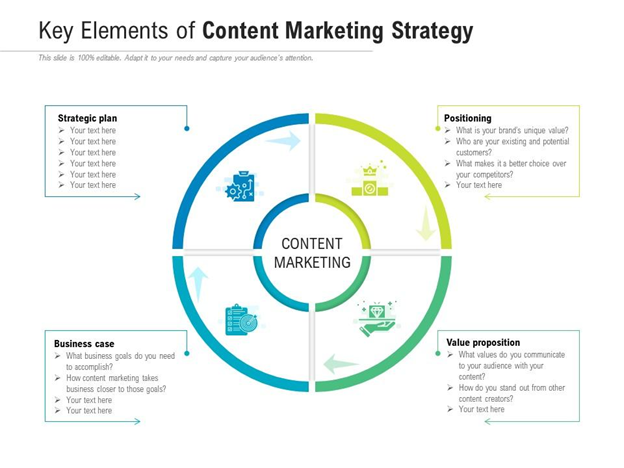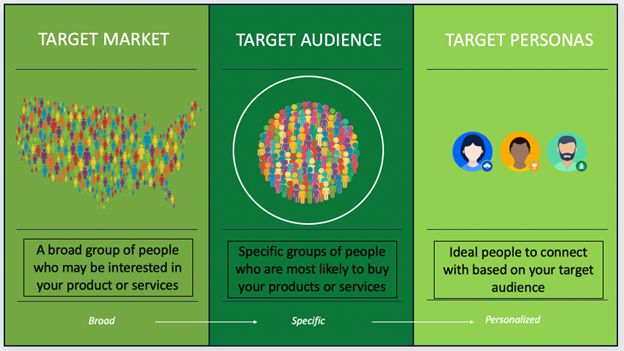Content
SHARE

In today’s digital landscape, content marketing has become vital to any successful marketing strategy. Understanding the basics of content marketing is crucial for businesses looking to effectively attract and engage their target audience. Businesses can build brand awareness, establish authority, and drive consistent traffic and conversions by implementing a well-thought-out content marketing plan.
[thrive_leads id=’8445′]
Understanding the Basics of Content Marketing
In the age of information overload, consumers are becoming more selective about the content they consume. Content marketing allows businesses to cut through the noise and connect with their audience on a deeper level. It involves creating and distributing valuable, relevant, and consistent content to attract and retain customers.
Content marketing has become an indispensable tool for businesses in today’s digital world. With the rise of social media and online platforms, consumers are constantly bombarded with advertisements and promotional messages. Traditional advertising methods are becoming less effective, and businesses need to find new ways to capture their audience’s attention.
Businesses can establish themselves as trusted advisors by providing valuable information and solutions to their audience’s problems. Content marketing allows businesses to showcase their expertise and build customer relationships. It is a long-term strategy focusing on creating meaningful connections rather than short-term sales.
The Importance of Content Marketing in Today’s Digital World
Content marketing is the key to standing out in an overcrowded digital marketplace. With traditional advertising becoming less effective, businesses need to provide valuable information and solutions to their audience’s problems. By building relationships through content, businesses can position themselves as trusted advisors in their industry.
In addition to establishing trust and credibility, content marketing also helps businesses improve their search engine rankings. When businesses create high-quality content that is relevant to their target audience, search engines recognise their website as a valuable resource. This leads to higher visibility in search results and increased organic traffic.
Furthermore, content marketing allows businesses to engage and interact with their audience. Creating content that sparks conversations and encourages feedback allows businesses to gain valuable insights into their customers’ needs and preferences. This feedback loop enables businesses to continuously improve their products and services, ultimately leading to customer satisfaction and loyalty.
 Key Elements of a Successful Content Marketing Strategy
Key Elements of a Successful Content Marketing Strategy
To create a content marketing strategy that delivers results, businesses must focus on three key elements: understanding their audience, setting clear goals, and choosing the right content formats.
Understanding the audience is crucial for creating content that resonates with them. Businesses need to conduct thorough research to identify their target audience’s demographics, interests, and pain points. This information will guide the content creation process and ensure that the content is relevant and valuable to the intended audience.
Setting clear and measurable goals is another essential element of a successful content marketing strategy. Without clear objectives, businesses may struggle to track their progress and determine the effectiveness of their efforts. Whether the goal is increasing website traffic, generating leads, or improving brand awareness, having specific goals helps businesses stay focused and make data-driven decisions.
Choosing the right content formats is also crucial for capturing the audience’s attention and effectively delivering the message. Different formats appeal to different audiences, and businesses need to experiment with various formats to find what works best for their target audience. Whether blog articles, videos, infographics, or podcasts, businesses should adapt their content to suit their audience’s preferences.
By incorporating these key elements into their content marketing strategy, businesses can create a cohesive and effective approach that drives results and helps them achieve their marketing objectives.
Setting Clear and Measurable Goals
To drive effective content marketing, it is essential to set clear and measurable goals. Whether it’s increasing website traffic, generating leads, or improving brand awareness, having objectives in place ensures that efforts are aligned and progress can be tracked.
Setting goals provides businesses with a sense of direction and purpose. It helps them prioritise their efforts and allocate resources effectively. Businesses can measure their performance by defining specific metrics and targets and making data-driven decisions to optimise their content marketing strategy.
Moreover, clear and measurable goals enable businesses to evaluate the success of their content marketing efforts. By regularly monitoring key performance indicators (KPIs), businesses can identify areas of improvement and make necessary adjustments to their strategy. This iterative approach allows businesses to continuously refine their content marketing tactics and achieve better results over time.
 Identifying your Target Audience
Identifying your Target Audience
Before creating content, businesses must understand their target audience’s needs, preferences, and pain points. Businesses can tailor their content to address specific customer segments by defining buyer personas and ensuring relevance and engagement.
Identifying the target audience involves conducting market research and gathering insights about their demographics, interests, and behaviours. Businesses can use various methods, such as surveys, interviews, and social media listening, to gather valuable information about their audience. This information helps businesses create content that resonates with their target audience and solves their problems.
Businesses can also personalise their content by understanding their target audience to enhance the customer experience. Personalisation involves delivering content tailored to each customer’s individual preferences and needs. This approach increases engagement and fosters a sense of connection and loyalty between the business and its customers.
Choosing the right content formats
Content comes in various forms, from blog articles and videos to infographics and podcasts. The right formats depend on the target audience’s preferences and the nature of the content being shared. Experimenting with different formats can uncover what resonates most with the audience and yield the best results.
Businesses should consider the type of information they want to convey and the best way to present it when choosing content formats. For example, videos or infographics may better explain complex concepts, while long-form blog articles may be better suited for in-depth analysis.
It is also important to consider the platform on which the content will be shared. Different platforms have different content requirements and user preferences. For instance, social media platforms like Instagram and TikTok are more visual-oriented, while LinkedIn and Medium are more text-focused. Adapting the content to fit the platform’s format and user behaviour increases the chances of reaching and engaging the target audience.
By experimenting with different content formats and analysing the audience’s response, businesses can refine their content marketing strategy and optimise their efforts for maximum impact.
Building a solid content marketing plan
Once the basics are understood, businesses can begin building a well-rounded content marketing plan that aligns with their goals and targets their audience effectively.
But what exactly does it take to create a content marketing plan that stands out from the crowd? Let’s dive deeper into the key elements that make a content marketing strategy successful.
Creating high-quality, engaging content
The cornerstone of any successful content marketing strategy is creating high-quality, engaging content that resonates with the audience. Content should be informative, entertaining, and provide value to the reader.
Imagine a business that wants to promote its new line of eco-friendly products. Instead of simply listing the features and benefits, it could create articles that educate consumers about the importance of sustainable living and provide practical tips on incorporating eco-friendly practices into their daily lives.
Businesses can attract and retain their target audience by consistently publishing valuable content. This helps build brand loyalty and positions the business as an authority in its industry.
 Utilising SEO for content visibility
Utilising SEO for content visibility
Search engine optimisation (SEO) plays a significant role in content marketing success. Businesses must optimise their content for relevant keywords and ensure that it is easily discoverable by search engines.
Let’s say a business specialises in handmade jewellery. They can conduct keyword research to identify popular search terms related to their products, such as “unique handmade necklaces” or “artisan earrings.”Strategically incorporating these keywords into its content, such as blog posts or product descriptions, increases the chances of appearing higher in search engine results.
This boosts organic traffic and improves visibility among potential customers. When done right, SEO can be a powerful tool in driving targeted traffic to a business’s website.
Promoting your Content Effectively
Creating exceptional content is only half the battle; businesses must also promote it effectively. After all, what good is great content if no one sees it?
Sharing content across social media platforms, email newsletters, and industry publications helps extend its reach and engagement. By leveraging the power of social media, businesses can tap into their existing network and encourage followers to share their content with their own followers.
Collaborating with influencers and partnering with other businesses for content distribution can also amplify its impact. Imagine a fitness brand partnering with a popular fitness influencer to create a series of workout videos or a cooking brand collaborating with a renowned chef to develop a collection of mouth-watering recipes.
By joining forces, businesses can tap into each other’s audiences and reach a wider demographic, ultimately increasing brand awareness and driving more traffic to their content.
So, whether you’re just starting or looking to revamp your existing content marketing plan, remember to focus on creating high-quality, engaging content, optimising it for search engines, and promoting it effectively. With a solid strategy in place, your business can reap the rewards of a successful content marketing campaign.
Implementing your Content Marketing Strategy
After developing a comprehensive plan, it’s time to put it into action and start producing and distributing content.
Tracking your content marketing results
To measure the effectiveness of a content marketing strategy, businesses must track relevant metrics such as website traffic, engagement rates, and conversions. This data provides insights into what is working and what needs improvement, allowing businesses to make data-driven decisions.
Making necessary adjustments to your strategy
Based on the data gathered, businesses must be willing to adapt and make necessary adjustments to their content marketing strategy. Testing and experimenting with different approaches can help refine the strategy and optimise results.
Staying updated with content marketing trends
Content marketing is an ever-evolving field, and staying up to date with the latest trends is crucial for success. Following industry experts and attending conferences and webinars can help businesses stay ahead of the curve and implement innovative strategies.By understanding the basics of content marketing, creating a solid plan, implementing it effectively, and continuously monitoring and improving, businesses can achieve content marketing success and reap the benefits of increased brand awareness, customer engagement, and conversions.
[thrive_leads id=’3729′]
Frequently Asked Questions About Content Marketing Results
What are the outcomes of content marketing?
Marketing through content leads to business growth. Having content on your site gives people reasons to visit, learn from, and become customers. You cannot attract visitors to your site without content.
When can you expect results from Content Marketing?
With strong websites, you’ll see leads coming in immediately or from month 2 or 3. With smaller websites, we’ve usually seen good results at the six month mark. In general, six months is a safe estimation.
Why is content marketing important?
Content marketing is important because it’s a cost-effective, sustainable marketing method that nurtures your audience, answers their questions, and builds their trust all of which helps your business generate better leads, more conversions, and more sales.
How can make good result for Content Marketing?
- Maximising profits
- Maximising brand awareness
- Maximising growth
- Website traffic
- Engagement rate
- Conversion rate
What Is The Purpose Of Content Marketing?
Content marketing is a strategic marketing approach focused on creating and distributing valuable, relevant, and consistent content to attract and retain a clearly defined audience and, ultimately, to drive profitable customer action.

 Key Elements of a Successful Content Marketing Strategy
Key Elements of a Successful Content Marketing Strategy Identifying your Target Audience
Identifying your Target Audience Utilising SEO for content visibility
Utilising SEO for content visibility










